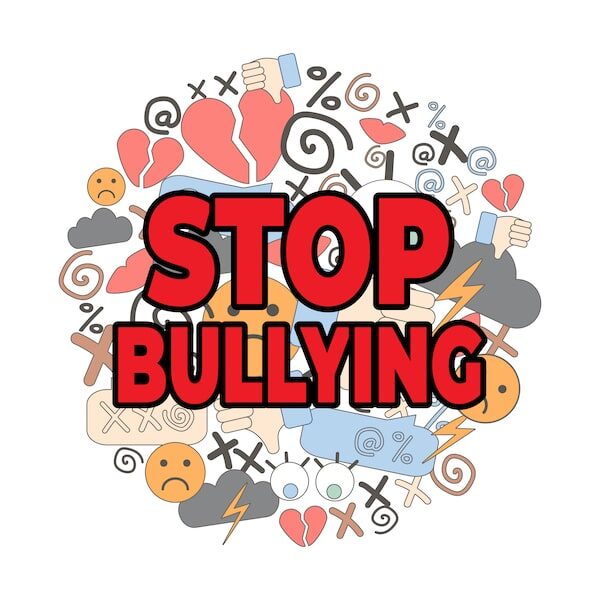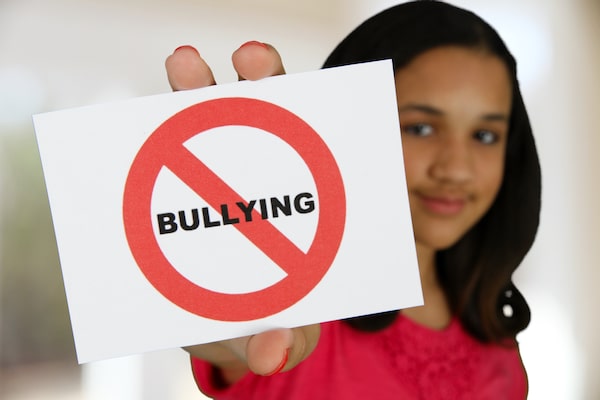
Bullying has become a hot topic of conversation in schools nationwide, particularly with ever increasing opportunities for cyberbullying. October is National Bullying Prevention Month and educating students on stopping bullies is important work. The trouble is “bullying” has become a catch-all term for any negative behavior between two people and it can be difficult to address effectively. It is important that bullying be taken seriously and that a message is sent that it will not be tolerated, but it’s also important to determine if another child (or your child) was being mean or was actually bullied/being a bully.
So What Is Bullying?
The CDC defines bullying as “any unwanted aggressive behavior(s) by another youth or group that involves an observed or perceived power imbalance, and is repeated multiple times or is highly likely to be repeated.” Bullying behaviors can be physical, verbal, social, and/or damage to personal property. The power imbalance is a key component to bullying. If kids go back and forth in a name calling war, it could just be mean behavior but not reach the level of bullying. It is important to determine if the bully has some dynamic of power- real or perceived. It’s also important to consider the repetition of this behavior- a one-off incident likely isn’t considered to be bullying unless it is likely that these behaviors will continue again.
Why It Matters From a Mental Health Standpoint

No one likes to be mistreated, but the impacts of bullying can stretch beyond hurt feelings because of the repeated nature and the way it often leaves its victims feeling powerless. Being bullied is considered an Adverse Child Experience (ACE) and these potentially traumatic experiences have been correlated with long-term physical and mental health consequences. It also impacts a child’s sense of self. The messages we hear about ourselves, especially in our formative years, often become the messages we believe and tell ourselves throughout our life. Being bullied can lead to low self-esteem and social isolation, both of which negatively impact our mental health.
What Is My Role?
- Validate their hurts, fears, and anger. If your child comes to you and shares that they are being bullied, it is important to take them seriously and respond with urgency. Ask them to explain what happened and how it made them feel in the moment. Before becoming defensive or jumping on the phone with the school, make sure your child knows you understand how they’re feeling. Try phrases such as “Wow, it sounds like that was pretty scary” or “I can see why that would hurt your feelings.” As you ask questions to understand whether your child is being bullied or rather someone was mean to them, be sure not to be dismissive in tone or with your words. Even if it was just an unkind incident, their perception of being bullied is still important and hurtful to them.
- Advocate. Once your child has calmed down and shared everything, it may be time to reach out to the school to address bullying behavior. This could be a good opportunity to empower your child to reach out to his/her teacher or school counselor– either with you or on their own. It’s important that your child feels that their concerns are being taken seriously and that some level of action is being taken. Most schools have a formalized process for handling bullying concerns and the school counselor is likely the best person to start with.
- Educate. If your child is feeling bullied, try to help them understand that bullying behaviors often come out of insecurities and a desire for control. Help them to identify safe people who can help them in the school (peers and staff) and practice ways they can respond if they’re open to it. If the experience doesn’t seem like it was bullying, it may be time to gently explain the difference between someone being a bully and someone being mean. Give examples of cases of bullying and cases that are not and have your child discuss with you which ones are and which ones aren’t and why.
What If MY Child is The Bully?
It can be hard to admit or to see our own children as capable of bullying others but it is important that we as parents are a part of the solution. Whether you’ve noticed unkind tendencies in your child’s behavior or you have gotten a call from the school, it’s probably time to talk with your child about what’s going on. It is certainly important to correct the behavior and to make it clear that it is unacceptable and to follow through on appropriate consequences. At the same time, it’s important to remember that all behavior is functional. What about that type of behavior has become functional for your child and why? Does it give them attention? Does it give them a sense of control that they are unable to find in other circumstances? Does it give them the type of social status they desire because others laugh or think they are cool? Knowing the motivation beneath the behavior always matters in addressing the behavior. If they don’t seem able to identify what’s going on within themselves or they are unable to hear it from you, therapy could be a next step to offer third-party support in identifying the root of the behaviors and more effective ways to cope with their feelings. Therapy may also be a good option for a child who has been bullied who continues to struggle with issues of fear/anxiety, low self-esteem, anger, or feelings of powerlessness.
At Milestones we’d love to connect you with a therapist who can walk alongside your child and help them build resiliency skills. Give us a call at (443) 574-4295 or check out our website for more information about child therapy! Feel free to reach out to us to schedule a first session at (443) 574-4295.

